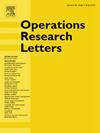Universally optimal staffing for Erlang-A queues facing uncertain arrival rates: The case of constraint satisfaction
IF 0.8
4区 管理学
Q4 OPERATIONS RESEARCH & MANAGEMENT SCIENCE
引用次数: 0
Abstract
Motivated by service systems where staffing decisions must be made before the arrival rate becomes known, we study the constraint satisfaction problem in an Erlang-A queue facing a random arrival rate. The objective is to find the minimum staffing level subject to a service level constraint that is modeled either (1) via an average constraint formulation that ensures a given quality-of-service (QoS) target holds on average by bounding the average fraction of abandoning customers below the said QoS target or (2) via a chance constraint formulation that ensures the QoS target for the random fraction of abandoning customers is met with high probability. Our primary contribution, under each constraint formulation, is to propose a policy that is shown to be universally optimal, i.e., irrespective of the magnitude of randomness in the arrival rate, the staffing gap between the proposed policy and the exact optimal policy remains bounded as the system size grows large. To the best of our knowledge, this is the first universal performance guarantee for constraint satisfaction in Erlang-A queues with random arrival rates and complements a recent result on cost minimization. The practical importance of this universality is that our proposed policy is a “one-size-fits-all” that is guaranteed to perform well for all levels of arrival rate uncertainty.
求助全文
约1分钟内获得全文
求助全文
来源期刊

Operations Research Letters
管理科学-运筹学与管理科学
CiteScore
2.10
自引率
9.10%
发文量
111
审稿时长
83 days
期刊介绍:
Operations Research Letters is committed to the rapid review and fast publication of short articles on all aspects of operations research and analytics. Apart from a limitation to eight journal pages, quality, originality, relevance and clarity are the only criteria for selecting the papers to be published. ORL covers the broad field of optimization, stochastic models and game theory. Specific areas of interest include networks, routing, location, queueing, scheduling, inventory, reliability, and financial engineering. We wish to explore interfaces with other fields such as life sciences and health care, artificial intelligence and machine learning, energy distribution, and computational social sciences and humanities. Our traditional strength is in methodology, including theory, modelling, algorithms and computational studies. We also welcome novel applications and concise literature reviews.
 求助内容:
求助内容: 应助结果提醒方式:
应助结果提醒方式:


